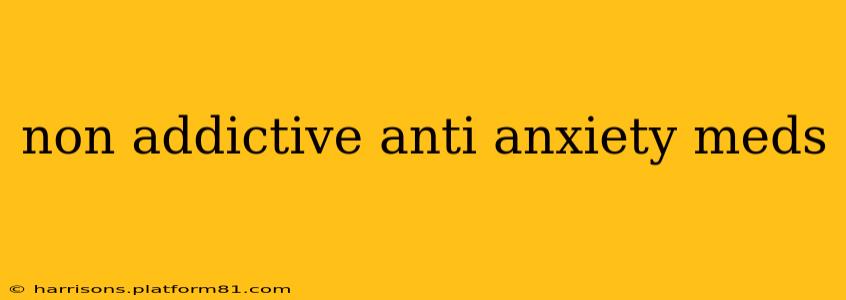Anxiety disorders affect millions, impacting daily life and well-being. While medication isn't always the first line of defense, for many, it's a crucial part of managing their symptoms. The fear of addiction often accompanies discussions about anxiety medication, leading many to seek non-addictive options. This guide explores several such medications and important considerations. Remember, this information is for educational purposes only and shouldn't replace consultation with a healthcare professional. Always discuss your treatment options with your doctor or psychiatrist.
What are Non-Addictive Anti-Anxiety Medications?
The term "non-addictive" is relative. While certain medications carry a lower risk of physical dependence compared to others like benzodiazepines (e.g., Xanax, Ativan), they can still lead to psychological dependence—meaning a reliance on the medication for emotional well-being. The medications discussed below generally carry a lower risk of both physical and psychological dependence than benzodiazepines when used as prescribed. However, always follow your doctor's instructions carefully.
Types of Non-Addictive Anti-Anxiety Medications
Several classes of medications can effectively treat anxiety with a reduced risk of addiction. These include:
1. Buspirone (Buspar)
Buspirone is a unique medication often categorized as an anxiolytic. It's thought to work differently than benzodiazepines, affecting serotonin receptors in the brain. It’s generally considered to have a low potential for dependence, but it can take several weeks to achieve its full effect.
2. Certain Antidepressants
Several antidepressants are effective in treating anxiety, even when anxiety isn't the primary diagnosis. These include:
- Selective Serotonin Reuptake Inhibitors (SSRIs): Examples are sertraline (Zoloft), paroxetine (Paxil), escitalopram (Lexapro), fluoxetine (Prozac), and citalopram (Celexa). SSRIs are first-line treatments for many anxiety disorders and generally have a low risk of addiction.
- Serotonin-Norepinephrine Reuptake Inhibitors (SNRIs): Venlafaxine (Effexor) and duloxetine (Cymbalta) are examples. They also have a low risk of addiction but can have more significant side effects than SSRIs for some individuals.
3. Beta-Blockers
Beta-blockers, primarily used to treat high blood pressure and heart conditions, can also be helpful in managing performance anxiety – such as public speaking or test-taking anxiety. They work by blocking the effects of adrenaline, reducing physical symptoms of anxiety like rapid heartbeat and trembling. While not directly treating the underlying anxiety, they can alleviate the physical manifestations. They're generally not prescribed for long-term anxiety management.
What are the Side Effects of Non-Addictive Anti-Anxiety Medications?
Like all medications, non-addictive anti-anxiety options can have side effects. These can vary depending on the individual and the specific medication. Common side effects may include:
- Nausea: Particularly common with SSRIs and SNRIs.
- Headaches: Can occur with various anti-anxiety medications.
- Drowsiness or fatigue: More common with some medications than others.
- Insomnia: Particularly with some antidepressants.
- Sexual dysfunction: A possible side effect of SSRIs and SNRIs.
- Weight changes: Some antidepressants can lead to weight gain or loss.
How Long Does it Take for Non-Addictive Anti-Anxiety Medications to Work?
The onset of effectiveness varies greatly among medications. Buspirone, for example, takes several weeks to reach its full therapeutic effect. Some antidepressants might show initial improvement within a few weeks, but it can take several months to achieve optimal symptom control. Your doctor will discuss realistic expectations regarding the timeline for your specific medication and situation.
Are There Any Natural Alternatives to Non-Addictive Anti-Anxiety Medications?
Several non-pharmaceutical approaches can support anxiety management, including:
- Therapy: Cognitive Behavioral Therapy (CBT) and other therapeutic approaches are highly effective in treating anxiety.
- Lifestyle changes: Regular exercise, a balanced diet, sufficient sleep, and stress-reduction techniques (e.g., meditation, yoga) can significantly impact anxiety levels.
It's crucial to note that natural alternatives might not be sufficient for everyone, and combining them with medication might be necessary. Always discuss holistic treatment plans with your healthcare provider.
Can I Stop Taking Non-Addictive Anti-Anxiety Medication Suddenly?
No, you should never stop taking any prescribed medication suddenly, even those considered non-addictive. Abrupt cessation can lead to withdrawal symptoms, varying in severity depending on the medication and duration of use. Always consult your doctor before making any changes to your medication regimen. They will guide you through a safe and gradual tapering process.
This information is for general knowledge and doesn't constitute medical advice. Consult your doctor or a qualified healthcare professional for diagnosis and treatment of anxiety. They can help determine the best course of action based on your individual needs and health history.
